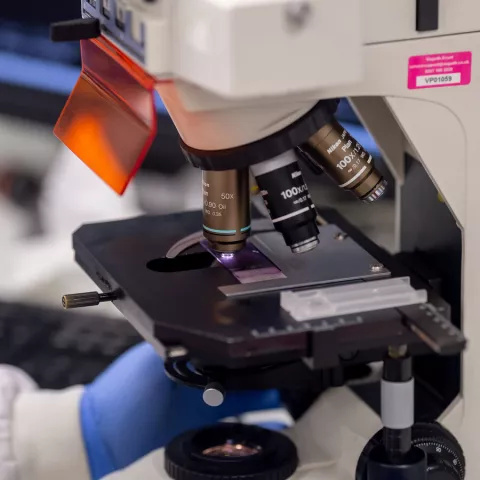Guy’s and St Thomas’ join London-based Advanced Therapy Treatment Centre
Friday 11 October 2024

Photo of a microscope
Guy’s and St Thomas’ has been awarded funding to form the London Advanced Therapy Treatment Centre, alongside King’s College Hospital NHS Foundation Trust, King’s College London, and partners across the city.
The new centre will be focused on accelerating the delivery of cell and gene therapy clinical trials.
The new centre is made up of four research organisations - Imperial College London, King’s College London, Queen Mary University of London and University College London - and their associated NHS Trusts.
The London Advanced Therapy Treatment Centre aims help more patients get access to potentially life-changing cell and gene therapies, by improving the infrastructure, increasing the number of trials and speed of patient recruitment.
The Advanced Therapy Treatment Centre network is coordinated by the Cell and Gene Therapy Catapult, and receives funding from the National Institute for Health and Care Research and Innovate UK.
Advanced therapies require complex processes such as modifying genes, using cells or engineering tissues. The London Advanced Therapy Treatment Centre will build upon the reputation of its partner organisations as a global hub for advanced therapies research and commercial clinical trials.
As part of the London Advanced Therapy Treatment Centre, research staff will be added to established and specialised teams across Guy’s and St Thomas’ and King’s College Hospital to help increase enrolment of patients onto advanced therapy clinical trials.
Evelina London, part of Guy’s and St Thomas’, is at the forefront of delivering gene therapies to children with life-changing conditions. In 2021, the specialist children’s hospital was the first in the country to give gene therapy, Zolgensma, to a baby with type 1 Spinal Muscular Atrophy.
Spinal Muscular Atrophy is a rare genetic condition that affects the nerve cells that link the spinal cord to the muscles. It can cause muscle weakness, movement difficulties with sitting up, crawling and walking, and problems with breathing and swallowing. It’s caused by an altered gene (called SMN1) being passed on to a baby from their parents.
Zolgensma works by replacing the faulty SMN1 gene with a new copy, which can improve symptoms and quality of life for babies with the condition. Evelina London is one of only six centres across the UK that can treat babies and young children with SMA type 1 with Zolgensma.
At Guy’s Cancer Centre, there are teams dedicated to developing and trialling new cell therapies for people with cancer. This type of immunotherapy uses a patient’s own immune cells to treat their cancer. T cells, a type of white blood cell important in the immune response, can be isolated from the patient’s tumour or blood, and may be modified in the laboratory to recognise cancer cells.
These T cells are then injected back into the patient’s bloodstream, where they detect and kill the cancer cells. This type of therapy has been shown to be very effective against some types of blood cancer and is currently intensively studied in patients with solid tumours.
James Spicer, consultant in medical oncology at Guy’s Cancer Centre and professor of experimental cancer medicine at King’s College London, said: “The London Advanced Therapy Treatment Centre represents an important step up in the provision that we can bring to bear on studying new therapies in cancer and other diseases.
"A lot of these clinical studies are too big and complex to run at just one site. By collaborating across the partner sites, we’ll be able to share best practice and expertise to deliver more treatments to patients safely and effectively."
The new centre joins the three existing Advanced Therapy Treatment Centres: Innovate Manchester Advanced Therapy Centre Hub; Midlands-Wales Advanced Therapy Treatment Centre; and the Northern Alliance Advanced Therapy Treatment Centre.
Last updated: October 2024
Contact us
If you're a journalist and have a media enquiry, please contact us.
Phone: 020 7188 5577
Email: [email protected]
